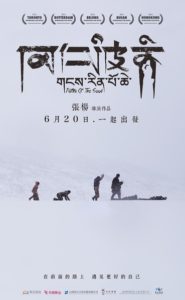Paths of the Soul
གངས་རིན་པོ་ཆེ། | 冈仁波齐
China, 2015, colour, 16:9, 117 mins.
Director: Zhang Yang 张扬.
Rating: 6/10.
Coolly observed docu-drama of a year-long pilgrimage by devout Tibetans to Lhasa.
Markam (Mangkang) county, Qamdo (Changdu) prefecture, eastern Tibet province, China, Jan 2014. Nyima, a herder, decides to accompany his uncle Yang Pei on a traditional pilgrimage to Lhasa, where they can visit a relative, Lama Thubten, and then climb the holy Mount Kailash. Yang Pei wants to do it before he dies, as his late brother never managed to. Other relatives and friends also join the expedition, including a young girl, Gyatso, and her parents Rigzin and Mu Qu. The 1,200-kilometre pilgrimage, due west to Lhasa, involves full-body prostrations every three steps. Behind the group of 10, Nyima drives a tractor with a trailer containing food, tenting and other necessities. In the snowy Dongda Mountains, the heavily pregnant Tsring goes into labour and gives birth to a baby boy, Dingzi Dengda, in a hospital. later, down in the warmer valley, Gyatso complains of head pains from all the kowtowing, but her mother tells her to carry on. Near Ranwu, they are invited to spend the night at the home of a man whose children are also on pilgrimage and who used to be the village head. The group helps out by working in the fields. While going through a canyon, Rigzin’s leg is injured in a rock fall. They later meet another pilgrim who has been on the road for seven-and-a-half months. Later, their tractor is ruined when a car accidentally hits it when avoiding a speeding lorry. The group plugs on, with the men pulling the trailer. After finally crossing Mount Mila, they come within sight of Lhasa. The 1,200-kilometre journey has taken them a year and they have no money left for the journey on to Mount Kailash. The men take jobs to earn some money and after a couple of months everyone sets off to the holy mount.
REVIEW
Three years after his beautifully played oldies heartwarmer Full Circle 飞越老人院 (2012), writer-director Zhang Yang 张扬 returns with another ode to quiet perseverance, but of a very different kind. Shot over a year in Tibet, Paths of the Soul གངས་རིན་པོ་ཆེ། | 冈仁波齐 is a lightly dramatised documentary following a group of peasants on a traditional pilgrimage to the provincial capital Lhasa, a 1,200-kilometre journey along Road 318 that involves a full-body prostration every three steps. Thanks to naturally paced cutting and quietly good-looking photography of eastern Tibet’s bare, mountainous scenery, it’s a far less painful journey for the audience than the participants. But with less human story than Kora 转山 (Du Jiayi 杜家毅 , 2011) and less rugged drama than Kekexili: Mountain Patrol 可可西里 (Lu Chuan 陆川, 2004) – both also set in Tibet and focusing on journies of discovery – it’s more pragmatic than inspirational, and would work equally well half-an-hour shorter.
Now nearing 50, Zhang has lost none of the cool, observational style that marked his early films like Spicy Love Soup 爱情麻辣烫 (1997), Shower 洗澡 (1999) and Quitting 昨天 (2001), as well as his urban yuppie drama Driverless 无人驾驶 (2010). Though the film is shot through with Tibetan customs, it doesn’t revel in or grandstand them; instead, Zhang shows, without any perceptible point-of-view, a group of people whose lives are totally dominated by religion and superstition, and are prepared to go to great physical lengths to prove their devotion. All undertake the pilgrimage out of either family duty (one accompanying his aged uncle), for the good fortune it will bring (in the lucky Year of the Horse), or as an act of penance for perceived sins (an alcoholic butcher who kills yaks, a family whose house-building led to two deaths).
But Zhang’s focus is more on the group than its individuals, who are largely shown in medium shot and hard to identify by name or relationship; as such, and with the selfless help of others en route, it’s a portrait of a whole society bound by common superstitions and a collective experience. Individual “performances” by the non-professional cast are likeable enough but, as in so many films featuring Tibetans, hard to closely identify with thanks to their phlegmatism. The film has none of the irony or warmth of Zhang’s previous road movie, the fictional Getting Home 落叶归根 (2007), and even in its more “dramatic” moments (a birth en route, a car crash, a final death) the emotion is held tightly in check, underlined by the absence of any music.
Despite that, and the sparse dialogue, the film maintains interest by focusing on things like brief moments of camaraderie on the road and the practicalities of the journey: preparing food, keeping warm, the aches and pains of the endless kowtowing, mending clothes and hand-plates, what to do when confronted by a flooded road, and getting work in Lhasa to finance the final stage of the pilgrimage up the holy Mount Kailash. Only at one point, when a former village head laments changes in society, does the film fleetingly touch on wider social issues.
The film’s Tibetan title is the name for the holy Mount Kailash, known as Gangs Rinpoche (“Precious Snow Peak”). The Chinese title is a transliteration of the Tibetan, though it doesn’t appear on the version reviewed, on which all credits were in English.
CREDITS
Presented by Helichenguang International Culture Media (CN), LeTV Pictures (Tianjin) (CN), Le Shi International Information & Technology Beijing (CN), Kunrungaohong Investment (CN). Produced by Helichenguang International Culture Media (CN).
Script: Zhang Yang. Photography: Guo Daming. Editing: Wei Le. Editing advice: Kong Jinlei, Yang Hongyu. Music: none. Sound: Yang Hao, Yang Jiang. Visual effects: Shi Wen (More Visual Production).
Cast: Yang Pei, Nyima Zadui, Tsewang Dolkar, Tsering Chodron, Seba Jiangcuo, Renqing Wangyal, Dawa Tashi, Jiangcuo Wangdui, Rigzin Jigme, Mu Qu, Gyatso, Dingzi Dengda, Suolang Nima (themselves).
Premiere: Toronto Film Festival (Contemporary World Cinema), 13 Sep 2015.
Release: China, 20 Jun 2017.
